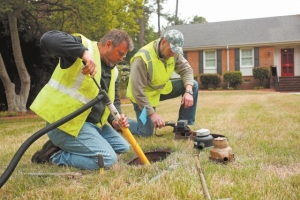Residential water meters replaced for automated ones
By Rochelle Moore
Published in News on April 12, 2018 5:50 AM

News-Argus/CASEY MOZINGO
Project manager Roy Cuthbertson pumps water out from around where he and project coordinator Charlie Daniels will be installing a new water meter on Pineridge Lane Monday.
Residents across the city of Goldsboro are receiving new automated water meters designed to increase reading efficiency, streamline service and red flag costly leaks.
Ferguson Waterworks started replacing residential meters in early March at different locations throughout the city. By the end of the year, the city's 15,000 residential meters will be replaced with Sensus accuSTREAM smart meters.
To date, close to 1,500 residential meters have been installed, said Roy Cuthbertson, Ferguson project manager.
The city of Goldsboro's $5 million contract with Ferguson Waterworks also includes the installation of 600 commercial Sensus Omni meters. The commercial replacements, which started in September, are nearly complete.
"The technology is one of the most exciting things to me that we're able to give to customers," said Kaye Scott, Goldsboro finance director. "I feel it's going to make things better for the customer. It saves the city money, too."
After the new meters are installed, customers will be charged based on gallon usage, instead of the previous cubic feet billing method. The conversion to gallons will not lead to additional costs, Scott said.
"There's no change in the rate," she said.
City officials decided two years ago to replace all city water meters after the meters, which were upgraded to automated technology, failed to work properly.
The meters, which were added in 2007, initially allowed city water crews the ability to read meters from a computer inside a vehicle while driving through neighborhoods. After the meters stopped working, city crews removed the automation and started manually reading meters again.
Today, it takes an entire month for city crews to manually read every water meter in the city, Scott said. As the new smart meters are installed, the work load will change for city workers, who will be able to read meters from a computer in city offices.
Technicians will still work in the field, responding to potential water leaks or other problems. They will install and program the meters.
"We still need our technicians to go out but we won't have to manually read (the meters)," Scott said. "Our technicians have to install these meters."
The smart meters will help customers, who will be able to track water usage online through the city's billing portal. City workers will be able to detect water leaks faster and any meter problems will be detected within minutes.
"One of the things we like about it is we can look at your consumption from the computer," Scott said.
If a water leak is found, city workers will notify residents or commercial customers.
The technology allows for water meter readings every 15 minutes, with the Sensus meters alerting city employees of problems. City employees can also reread meters easily, a process that previously required technicians to manually check readings onsite.
The smart meters are tamper proof, are GPS located and also notify city workers if they have been moved to another location.
City employees will also be able to disconnect water service from a computer, without technicians having to visit homes or businesses.
Currently, residents are being notified of the installations, with Ferguson Waterworks employees knocking on doors the day of the installation or leaving behind door hangers.
The installations take about 15 to 20 minutes, with Ferguson crews flushing outside water lines after each installation, Cuthbertson said.
The city financed the $5.3 million purchase and installation of the water meters through a 15-year loan, at a 2.49 percent interest rate, with the Bank of America Public Capital Corp.
Sensus provides warranties for the meters and the Sensus FlexNet communication system, said Travis Smith, Sensus director of smart water strategy. The technology is also expandable, with upgrades possible in future years, Smith said.
"It provides a lot of investment for the city to get benefits for years to come," Smith said.
City leaders researched the technology and reputation of the company prior to selecting the meters, Scott said. Sensus meters are currently being used in three of the Wayne Water Districts, the Fork Township water district and municipalities, including Cary and Hendersonville.
